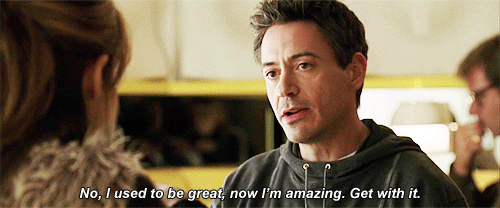
This post is written by a member of the Debut Student Publisher Network. Read on for Hiran’s epic guide to creating a personal brand at uni – trust us, you’ll want to be bookmarking this.
I’m assuming you’re the ambitious type. You see, the student who thinks “Uhh, I think I’ll graduate and get a job somewhere” wouldn’t have clicked on this article. They’ll be waiting for something to fall into their lap (SPOILER: nothing does.)
Not you. You’re probably busier than your friends. You’ve know a degree isn’t going to be enough to get the dream career you want. You’re reading this because you want to stand out and are looking for ways to do it. So, I’m not going to patronise you.
Here’s some real advice on how to develop a personal brand whilst you’re a student. Let me break it down in 10 manageable steps and holla at me when you’re done. I’m excited to hear it.
1. Get your social media working for you

Cull the negative/offensive/embarrassing pieces of content on your social media. Hide, privatise or remove any thing related to drugs, alcohol or those embarrassing Freshers’ photos from first year. Before you start saying, “I’m not going to change who I am for a job…blah”, think about those ‘banter pics’ following you around in five years time. It’s not pretty is it?
First impressions are super important. Remember that this is how strangers are going to perceive you. Your profiles will be seen most likely by recruiters and, more importantly, by future friends and networks. You want to show your best bits, so learn to cultivate. Then customise your URLs. It might take a day or two, but it will pay off.
2. It should be exactly what it says on the tin

Lies are one of the few things that can damage a brand, so tell your story honestly. If I asked you, I am sure you could ring off a list of five people who act and look completely different IRL to how they are perceived on social media. Whilst this drags people in, it’s a huge no-no. Be authentic.
Personal brands are supposed to be malleable and changeable. The 20-year-old you wasn’t the same as the 10-year-old you, and will be completely different to the 30-year-old you. Print out and stick this one-pager up on your wall to keep you consistent, but it’s okay to grow, adapt and change your mind. Once you have got your brand values in mind, you are ready to start sharing.
3. Share content and create conversation

Start by following and liking accounts that resonate with you and interact with them. The only way to stay relevant is to be relevant, after all. Twitter is great for this. As I’m interested in design, I follow and regularly engage with Logo Geek, It’s Nice That and Business Insider. Build up your confidence by seeing what is out there.
Then begin creating original content. This is what is going to get you on that first page of Google. Write for your student newspaper, start a YouTube account, raise money for charity, get involved in volunteering – all of these things are naturally shareable. Maybe even build a personal website.
4. Start early, become a BNOC

Throw yourself into as many things as possible. I joined 20 societies and organisations every year of uni, filling out most evenings, just to try something new. I got to know lots of people, and even if I never went back, it was a Facebook connection that I turned into something more.
Being known (for the right reasons) means you’re telling a compelling story. If you’re the blogger guy, or the video gamer girl, and that is what you set your brand out as, then you’re doing a great job. People recognise you by your talent. Find those people and talk to them – they’re probably just like you.
5. Celebrate your niche

Find something you are good at and make yourself amazing. If you are confident enough to show the process (warts and all!) that can be really compelling. Seth Godin is fantastic at explaining this. Locate great people to learn from. Invite them to help you. Collaborate. Make mistakes. Encourage people to comment and critique. Put yourself out there.
Follow the right people, find that niche and exploit it to get them engaged. If you are really interested in music, or art, or politics, then the chances are that your friends will have similar or opposing views. At university, you have students with the time and energy to commit with very little personal loss, so test the waters and go for it.
6. Promote yourself without pissing people off

Take the “show, don’t tell” approach. Everyone always dreads self-promotion, but it is unavoidable. And there are ways to do it without people thinking you’re a total butt face. The trick is to be gracious, use humour and sometimes self-deprecation can work really well. Just don’t talk about yourself all the time…no one likes it in person, don’t do it online.
Share other people’s posts which align with your brand, and you’ll be surprised how quickly they will reciprocate. University is actually a great time to do it, because everyone is promoting something. A club night, a society event or even a graduate position – everyone’s wearing a logo on their hoodies these days. Use this to your advantage.
7. Networking is talking with a purpose

Every conversation has gold dust potential. Most people are really intimidated with the word “networking” but it is purely conversation with a purpose. It is all about perspective and starting right. Don’t just talk at people – be willing to listen and understand where they are coming from – the more you empathise, the more students are willing to listen.
Make impressions with people you haven’t met yet. Most of the time, your brand is developed when you aren’t even there. When people mention your name, what would you like them to hear? Write these qualities down and bring them into your patter. Be positive, pragmatic and fulfil your promises to people. Make them laugh and smile. They are much more likely to trust you if they actually like you.
8. Put everything in one place

Take the plunge and create a personal website. In the last five years, I’ve had two and here is my baby at the moment. When anyone asks me what I do, it is so cool to point them to my little corner of the internet. Domain names and hosting are pretty cheap these days, and you can even hire someone to make the whole thing for you. As a student, it will make you stand out instantly and show you are serious.
You’ll literally never look back. I know it sounds weird, but having a personal website forces you to keep your personal brand fresh. It means that you need to write blogs constantly, update the projects you are working on and make your CV look polished all of the time. I guarantee it will be your proudest thing and you’ll be sharing it daily.
9. Reputation is everything

You already have everything at your feet to play with. If you went to a good school, got a degree from a great university, climbed a mountain, raised a boatload for charity, started a business or did something incredible – you are already in the awesome minority. Your story is already compelling. Now, tell me what it is in a compelling way.
Boost your reputation from working with great brands. Make sure you only like and share people that align with your personal values. Every brand you work with is a tacit endorsement, so be super careful. Even celebrities get it wrong and they are reliant on their personal brands. The popularity of influencer marketing means that bigger brands are looking to creative students for greater influence. It couldn’t be a better time to have a personal brand.
10. Focus on the big picture

Don’t be fooled by short-term syndrome. Don’t give into the temptation that everything must be lived in the present – you CAN start building for the future now and you shouldn’t be ashamed to start. It is easy to get bogged down in grades and things that happen at uni, but there is a big world out there. Take the time to decide what you want to do and how you can get there. It will be a fantastic head start.
What sort of person do you actually want to be? This is a personal process. Are you the type of person to put things off? Is your perfectionism slowing you down? Are you impulsive? Do you deliver on your promises? Can people trust you? In the end, the person you decide to be has the biggest impact on your future. These are the things that people will remember you by, and the decision to make yourself memorable, is entirely yours.
—
If you’ve done all of these things well, the litmus test will be that people come back. They will celebrate your achievements and want to be a part of your network. Individuals – like Kim Kardashian, Barack Obama and Justin Bieber – have powerful brands which are infectious for most people. All of them deliver something that we come back for, time and time again, and we buy into them every day. There is nothing stopping you being the next.
Feature image В© e-lawyer.com
Follow Hiran on Twitter @Hiran_Adhia
Connect with Debut on Facebook and Twitter


